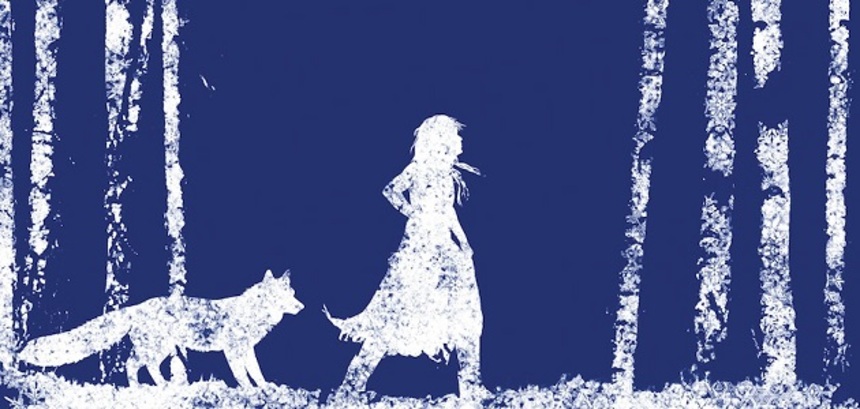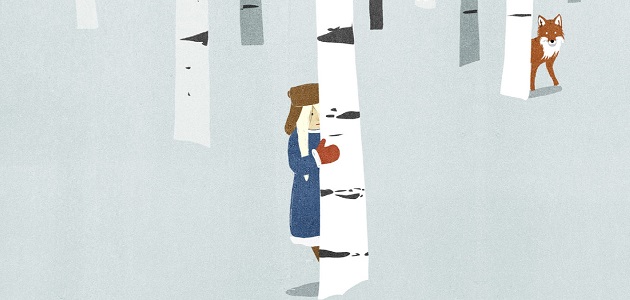Books to be Scene: Eowyn Ivey's THE SNOW CHILD

Those first boot prints in the snow - they began at the vanished [snowman] and ran from there into the woods. No tracks came into the yard.Women, huh?
Then there was the frost that crystallised on the window as she and Jack had watched, and the snowstorm that had blown her back towards home ... Most of all, there was the child herself, her face a mirror of the one Jack had sculpted in the snow, her eyes like ice itself. It was fantastical and impossible but Mabel knew it was true - she and Jack had formed her of snow and birch boughs and frosty wild grass. The truth awed her. Not only was the child a miracle, but she was their creation. One does not create a life and then abandon it to the wilderness.
Excuse me?
Women. Simple creatures, am I right? (Except when they're, you know, just being wilfully obstinate for no reason at all.) Cinema and television don't have to do much to keep them happy - a little treacly melodrama, some tears, moderate peril (but not too perilous), a glimpse of a few taut six-packs and a happy ending that wraps up, well, most of the loose ends. Sit back and watch the box office receipts roll in! Hell, not for nothing do we refer to a particular type of light entertainment as "chocolate-box" - oh, you know what I'm implying, ladies, don't go making those faces.
I think we're getting more than a few angry looks over here -
Okay, let's be a little more serious - before my mother reads this, cough cough. If a disturbingly large number of mainstream filmmakers still seem to think of women as a dutiful audience of sheeple who'll sit down for any old crap as long as it tickles their pleasure centres, then genre cinema has it even worse. Whither fantasy and science fiction with a feminine touch, when all the Twilight moms are anxiously looking for the latest piece of man-candy they can mentally cast in the next Fifty Shades of Grey? How about a story with magic and mystery but depth and nuance, too, dark enough to move you to tears but light enough it's actually got universal appeal?
And this isn't just some awful nerd bait you think will impress girls?
Eowyn Ivey's The Snow Child makes for a nice, simple pitch: it's 1920s America, and a middle-aged couple wanting to patch up their marriage are planning to make a new start out on the Alaskan frontier. They've heard stories about the pioneer lifestyle, but they're woefully unprepared for the reality - how hard the land is, how wild the climate - and the emotional fallout of the wife's long-ago miscarriage is still hanging heavy over both of them. Just as they're thinking maybe they should turn tail and head back to civilisation, one mysterious, snowbound evening the couple come across a little girl in the forest. But is she the replacement for the child they never had, or something much darker and stranger? Can they keep her, or do they risk paying a terrible price by even trying?
Do they, don't they, do they, don't they...
It's not quite that simple. The Snow Child is based on an old Russian fairy tale of the same name, but Ivey makes no secret of this, nor does she lean too heavily on the connection. There's no dramatic twist as such: the couple, Jack and Mabel learn the original story without too much difficulty (the novel even includes an English translation), and things don't even start getting particularly fantastical until a fair few chapters in. Until then it's a fairly standard period piece, at least on the surface; a husband losing touch with his wife, a wife worried she's lost a connection with anything and unsure how to get it back. Both of them are afraid to bring up the possibility that travelling to the edge of the world to start over might not have been the panacea they were looking for.
 So far, so generic -
So far, so generic -Maybe, on paper. But either way Ivey has a great feel for the basic building blocks she's using, striking a fantastic balance between laying on period detail and provoking an emotional response. Some of her character development is more gentle and a little on the sugary side, yes, but there's enough genuine, deeply felt weariness and pain the lighter moments feel more earned than self-indulgent. And it's not all internal monologues, either: like the best writers trying for a sense of place, the landscape in The Snow Child is a character by itself, a harsh, implacable country both eerily beautiful and terrifyingly vast, where the descriptions of endless, snow-bound tracts of untamed wilderness scream for as many helicopter and crane shots as you could cram into ninety minutes.
So what about when the magic happens?
When the magic finally happens, Ivey's greatest success is how seamlessly she marries a glimpse of the numinous to the mundane business of two people knuckling down and making the best of a bad situation. Moderate spoilers here: it's never openly stated whether or not Faina, the little girl, is simply a lost child gone feral or... something else, but the book throws in some beautifully judged evidence to support both sides of the argument; on the one hand, say, she comes and goes without warning, heralded by the snow, on the other, Jack and Mabel discover certain things in the forest that hint at a simpler, much more tragic explanation.
Does the woman just not want to pick a side, or...?
Not so much. However you choose to interpret it, The Snow Child is still a fantasy at heart. Ivey's careful never to throw too much otherworldliness at the reader, but she still makes great use of what are some surprisingly straightforward gimmicks. There's the winter imagery, all silence, fragility and mute, unguarded wonder, and the curious choice to drop quotation marks from everyone's dialogue whenever Faina appears. This is tremendously effective, one of the most appealing things about the book, and it's not hard to think of numerous ways you could translate it to the screen, whether you went for visual trickery or just playing with the audio.
And yet you think it'd play the red states, no problem.
Well, despite all the airy-fairy mystery The Snow Child is still a very grounded, quietly mature story about a broken relationship that feels so heartbreakingly believable you long for it to be fixed. Too often retooling fantasy for a wider cinema audience results in soulless abortions like Stardust, all pointless comic relief and jarring popcorn gloss so desperate not to upset anyone it ends up as weak tea through and through. None of that in Ivey's prose, at least; she works with such lightness of touch the magic never swamps the character arcs going on. Though it's still there. When Jack or Mabel stop and marvel at the wild, disturbing beauty of it all - this nervous forest sprite who waltzes soundlessly in and out of their lives, who may or may not even be real - their awe towards her, their need is overwhelming.
It's a fantasy your mother could love, without ever really realising that's what she was watching - okay, my mother, then. Jeez. (She doesn't really go for the numinous, bless her.) But The Snow Child is also a truly magical, captivating book that's just dangerous enough to please open-minded genre fans; never, ever anything so pandering as chick-lit. It deals with real pain and longing, real romantic love in all its forms, but also impossible wishes fulfilled on a whim, and all the scary, messy consequences that implies. I know, I know, there's more money in chocolate-box film-making, but if someone was bold enough to risk giving the ladies (all right, giving all of us) something just that little bit more adventurous, you couldn't go far wrong with this.
The Snow Child, by Eowyn Ivey, published by Reagan Arthur in the US and Headline Review in the UK, is available in paperback, hardback and ebook editions.
Images taken from the UK and US cover art.

Do you feel this content is inappropriate or infringes upon your rights? Click here to report it, or see our DMCA policy.






